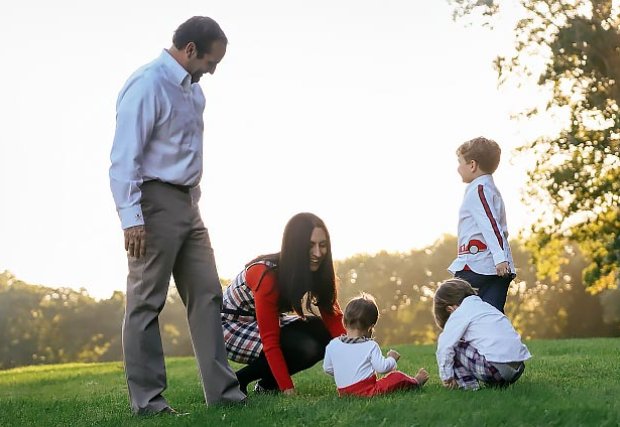Growing up in the suburbs of Boston, where her late father was Chief of OB/GYN at Newton- Wellesley Hospital for three decades, Leslie Yeransian always envisioned having the best childbirth experiences. She was blessed with two healthy children in her first two pregnancies, but the deliveries didn’t go as expected. Both resulted in unplanned C-sections. She was left feeling disappointed and defeated. Recovering from her C-sections was difficult and painful. The third time would be different, she decided – especially since she needed to rebound quickly to chase after her active toddlers.
The first challenge was finding a team that would work with her. “After two C-sections, most doctors and midwives don’t give the option to have a vaginal birth,” she explains.
Leslie’s exhaustive search to find a willing and capable provider led her to GW Hospital. When she was less than four months from her due date, she reached out to Terry Francis, Director of Women’s Services, and received a call back right away. Terry shared information about the hospital’s C-section rate – which was 24 percent in 2016 compared to a national rate in 2015 of 32 percent.* Even more important to Leslie was the hospital’s experience helping women achieve a vaginal birth after cesarean (VBAC) through its collaborative care model. This approach supports natural childbirth with a certified nurse midwife in a hospital environment. Leslie, who lives about 30 miles from the hospital, had found her team.
Board-certified OB/GYN and maternal-fetal medicine subspecialist John Larsen, MD, FACOG, FACMG, recently retired from The GW Medical Faculty Associates, explains that GW Hospital tries to offer a broader choice to women in planning their childbirth. When a patient presents her strong personal desire to give birth vaginally, he
says they talk about it together. “If something looks too dangerous, we would say no,” he says, recognizing that the health of mom and baby always comes first.
"Our key priority is to help women feel safe and supported,” says Whitney Pinger, director of midwifery at GW Hospital. “When expectant moms feel safe, they have less anxiety, and that changes their brain chemistry. Feeling safe actually helps to promote a spontaneous and normal labor process,” Whitney explains. This safe feeling was not something Leslie experienced with her first trial of labor after cesarean (TOLAC), but would have made all the difference in the outcome, she says.
After following the midwifery guidelines on diet, exercise and other best practices, Leslie delivered Oscar Ward Dolsak naturally, just 90 minutes from her first contraction. “I say he’s my Oscar Award, and I credit this speedy labor and remarkable birth to GW Hospital,” she says. “It was an all-hands-on-deck effort. Everyone was there to support me – my midwife, the attending physician, my doula, the charge nurse and the labor nurses. My neonatologist, Dr. Tetyana Nesterenko, worked with Whitney to ensure that Oscar could go quickly to my chest. I felt safe and loved at my most vulnerable time,” Leslie says. “God put all the right people into action.”
*Centers for Disease Control and Prevention
Specialized Care for Mom and Baby
“Here at GW Hospital, we follow evidence-based practices that support the safest, best possible childbirth experience in accordance with each mom’s individual birth plan,” says board-certified OB/GYN Nancy D. Gaba, MD, FACOG, chair of the Department of Obstetrics and Gynecology. “We help moms make informed choices based on their personal medical history and what is important to them.”
For babies who are born prematurely or with special needs, the Level III Neonatal Intensive Care Unit (NICU) provides 24/7 emergency care. Even women with the most straightforward pregnancies can develop significant complications during labor and delivery, says Whitney Pinger. “When that happens, we have all the necessary medical systems in place. The NICU is part of that,” she says.

